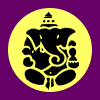| Free Jyotish Newsletter |
 Jyotish.ws
Jyotish.wsSanskrit and Latvian
By Michael Laughrin
 Sanskrit is the ancient mother tongue of most of the languages spoken in India and almost all the languages spoken in Europe (among the exceptions are Basque, Albanian, Hungarian, Finnish and Estonian).
Sanskrit is the ancient mother tongue of most of the languages spoken in India and almost all the languages spoken in Europe (among the exceptions are Basque, Albanian, Hungarian, Finnish and Estonian).
Most people probably think that Hindi or another North Indian language is the closest modern language to Sanskrit. Wrong. Lithuanian is the closest modern language to Sanskrit, with Latvian a close second. I am lucky in that my wife Mara was born in Latvia and is a native speaker of modern Latvian. Also, she has an M.A. in Linguistics, so she knows something about languages.
At this point, I would like to say that this article is not scholarly; it is just me (with the kind help of Mara) talking about something that fascinates me. I am strictly an amateur.
Both Mara and I are deeply involved with the ancient Vedic tradition from India. Included in this is mantra shastra, Hatha Yoga, meditation, Jyotish, Ayurveda and Yagya.
There is an important herb (primarily for women) in Ayurveda called Shatavari. Literally, it means "one hundred husbands". I asked Mara how you would say that in Latvian and she told me "simtu-viri". This cannot be a random connection.
I have often listened to Mara speaking on the phone with her mother in Latvia. A common answer to the question "How are you?" is Labi. It means "good" in Latvian. In Jyotish, the 11th house is called the Labha Stana. Labha in Sanskrit means "gain." Now, to ancient people, gain or wealth was always good. I am quite sure that these 2 words are cognates.
Here is another word that probably has something to do with Vedic Astrology. I asked Mara how to say Moon in Latvian, and her answer was Meness. Now the Sanskrit word for Moon is Chandra. But . . Manas means Mind. And, in Jyotish, the Moon is the planet that stands for the mind. Again, the chances of these connections being random are slim to none - at least to my mind.
Here is a further list of probable cognates between Sanskrit and Latvian. I have not used diacritical marks in either Sanskrit or Latvian.
| Sanskrit | Latvian | |
| 1. Pada (foot in English) | 1. Peda | |
| 2. Surya (the Sun) | 2. Saule | |
| 3. Danam (to give) | 3. Davat | |
| 4. Agni (fire) | 4. Uguns | |
| 5. Madhu (honey) | 5. Medus | |
| 6. Bhratr (brother) | 6. Bralis | |
| 7. Yatra (pilgrimage) | 7. Jat (to ride a horse) | |
| 8. Aksha (eye) | 8. Ace | |
| 9. Dvar (door) | 9. Durvis | |
| 10. Svapnah (dream) | 10. Sapnis | |
| 11. Mishra (mixed) | 11. Maisit (to mix) | |
| 12. Bhu (to be) | 12. But | |
| 13. Ubha (both) | 13. Abi | |
| 14. Mrityu (death) | 14. Mirt (to die) | |
| 15. Jiva (living being) | 15. Dziva (F) - to be alive | |
| 16. Sva (my own) | 16. Sava (my own) | |
| 17. Vayu (wind) | 17. Veju (wind - in the accusative mode) |
So, you see, the connections between Latvian and Sanskrit seem very compelling - at least to me.
Another thing is that Sanskrit is supposed to be the only perfect language. From my own experience of listening to Latvian (and I do not know more than 10 or 15 Latvian words), on the finest feeling level, Latvian feels very pure, uplifting and even celestial.
(c) copyright 2013 Michael Laughrin.
From the February/March, 2013 issue of Michael Laughrin's North American Jyotish
Newsletter. Click to subscribe to this free Jyotish newsletter.
Read more articles.